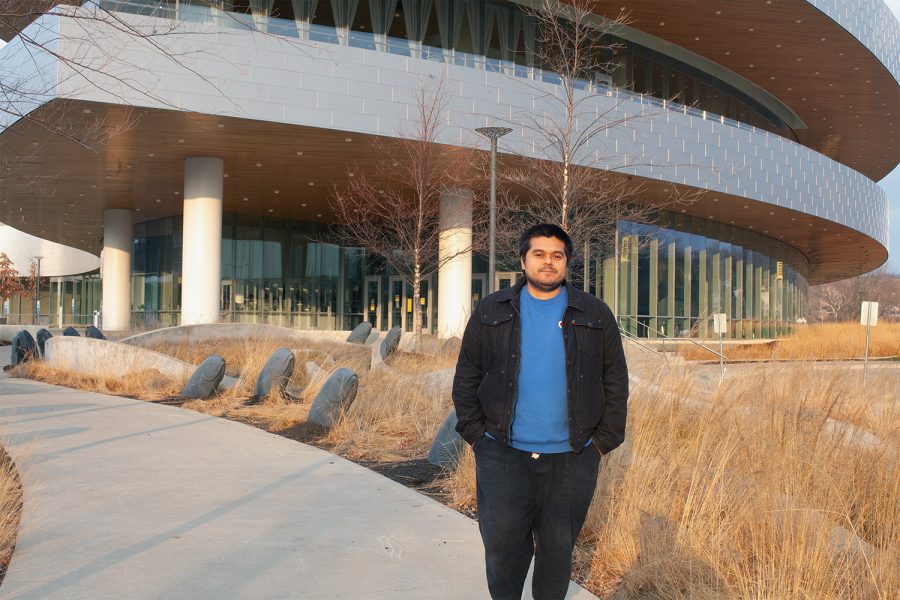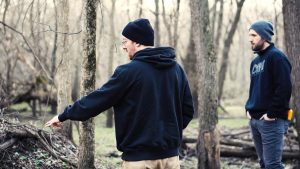Obermann Center presents panel on bilingualism in Iowa
The Obermann Center for Advanced studies will host a talk on bilingualism and bilingual education in Iowa. The talk will feature both an artistic and academic perspective from UI Professor Christine Shea, and storyteller Chuy Renteria
Author Jesus “Chuy” Renteria standing in front of Hancher Auditorium is seen on December 6 2020. Renteria and Associate Professor Christine Shea will attend Obermann Around The Table to talk about their bilingual experiences and bilingualism in Iowa as a whole.
December 7, 2020
In recent years, the state of Iowa has seen rapid growth in its Latino population has rapidly grown, according to the State Data Center of Iowa. Along with this growth came an increase of bilingualism in Iowa, for which the Obermann Center for Advanced Studies has seen an active need for conversations about, including an increased need for bilingual.
The center will present “Obermann Around the Table: A View of Bilingual Education in Iowa” on Dec. 9, the second event of its new virtual discussion series. The interactive event will discuss bilingualism as a whole, before narrowing to pursue an increase in education about bilingualism. The conversation will ultimately further the center’s exploration of how Latinos are now a driving force in Iowa and the Midwest and have positively impacted communities.
Each Obermann Around the Table discussion includes a performance from a University of Iowa artist that brings a creative perspective to the topic, followed by an academic presentation from a UI scholar. The audience is then included in a large, rich conversation that delves deeper into the subject. For this event, UI professor Christine Shea will present the academic portion of the panel.
Shea, a professor in the Department of Linguistics, has a specific focus on researching bilingualism. She said this conversation is an important one, because it brings light to the rapidly growing population of Latinos in Iowa, and reflects on Iowa’s ideals as a society, accepting that speakers of languages other than English have a right to use their languages and maintain them.
RELATED: UI and Iowa City schools address massive growth in English-language learners
She noted that being bilingual implies culture, and that the definition of bilingualism goes beyond speaking a binary of two languages.
“There are many, many, many different ways of expressing ourselves, and being open to what bilingualism really means expands that and helps us sort of grow on a specific but also kind of a broader level,” Shea said.
Writer Chuy Renteria will read from a portion of his upcoming memoir as the artistic presentation for the panel. The public engagement coordinator for Hancher Auditorium is based in West Liberty, Iowa, the state’s first majority Hispanic town, according to NPR. His book, “We Heard It When We Were Young,” focuses on his familial relationships in the context of language, specifically his relationship with his father, as well as what being bilingual means to him.
Renteria, a son of immigrants, also said that a conversation about bilingualism in Iowa is important because it is more universal than many people believe, and affects everyone, not just those who speak multiple languages.
“Even if you think [the conversation] doesn’t pertain to you, I’m willing to bet that it does,” Renteria said. “I think it speaks to how there’s different relationships in different towns close to Iowa City that people might not consider. You just go 20 minutes out to these towns, and a lot of times you’re going to see there’s way more diversity.”
Newly launched in November because of COVID-19, the Obermann Center’s Around the Table series aims to speak on a variety of important issues in the context of political and cultural events in 2020 that impact local communities, through a combination of artistic and academic perspectives.
In an email to The Daily Iowan, Obermann Center Director Teresa Mangum wrote that the program accomplishes the center’s mission to share the work of artists and scholars at the UI with a public audience while also offering a way to consider large cultural issues on a more local scale.
“We hope the program will spark honest reflections on where we are and creative action steps as we identify what changes are needed and steps we can take individually and collectively to create change,” Mangum wrote.




